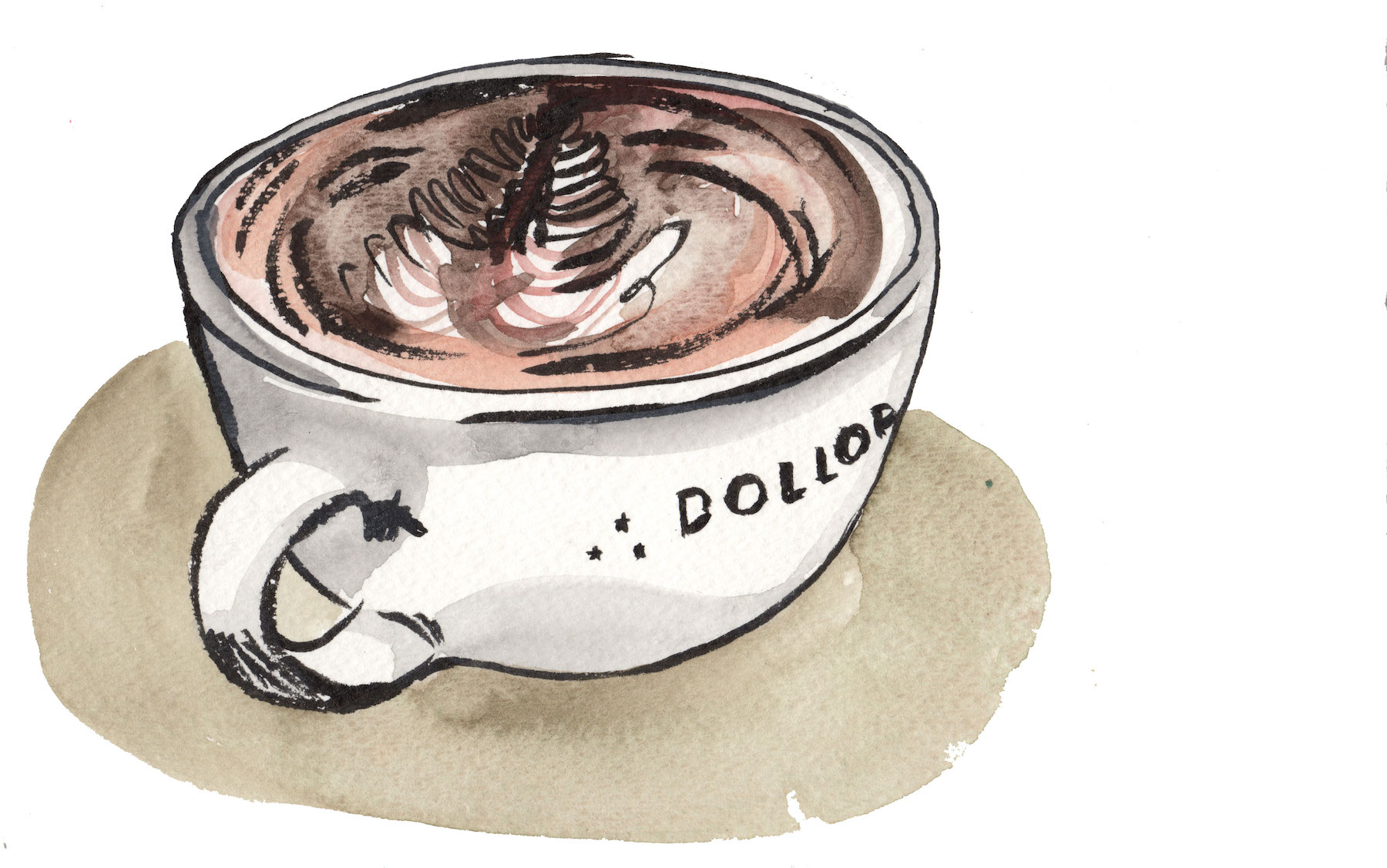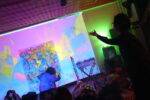This is a review of Dollop Coffee Co.
I’m a first year graduate student in the writing department and I rely on the second year students for advice on how to navigate school and the city: which professors are cool, where to eat and drink, where to study. This is how I discover Mahogany, the 1975 film starring Diana Ross, playing in Millennium Park; and the ninth floor reading room at the Harold Washington Library Center; and Ras Dashen, an Ethiopian restaurant in Edgewater; and how I learn to approach certain classmates with patience because they reveal themselves slowly. This is also how I face the loneliness and frustration of my first semester. Warily. Trying, as one famous writer said, to get familiar with the scope and structure of my ignorance. And when I ask a classmate about good coffee shops, she suggests one near the Jackson stop on the Red Line: Dollop.
In my neighborhood, there is a third-wave coffee shop called La Colombe that I assume is a stand-alone business. It has a stand-alone attitude. When I order a hot chocolate, the barista looks down her nose at me. The pastries are inconsistent. The tables are full of young men at laptops; and La Colombe does not have WiFi, so they must be working on their novels. Despite all this, I am shocked to learn La Colombe is a chain — with franchises in Korea.
Dollop is also a chain. I see a second location (there are six with a seventh on the way) when I switch buses from the 77 to the 22 at Belmont and North Clark. It is late at night and this is a new part of the city for me, close to where I live but in a separate zone of activity. Dollop is closed at this hour but I stick a pin in my mental map and plan to return.
* * *
For me, graduate school is full of paradoxes.
On the one hand I am supposed to dedicate an extraordinary amount of time to my studio practice — whatever that is: I am a filmmaker in the writing department; I make relational art but heat-producing appliances (including my cookie oven) are forbidden in the studio building; I photograph my dish rack every night but is that art? Or is it play, as my advisor calls it? What does she mean?
On the other hand, I am displaced, far from friends and family and my home landscape. Now is the strangest time to write. I’d rather be out nurturing my tentative new friendships, walking and going dancing. My classmates are in the same bind, also alienated and also scrambling to work. The easiest thing is to chat for a few minutes after class and then take our separate subway lines home to our writing desks. But what to write about when one’s not really living?
I find an ally in another first year writer. After class, we walk around the Loop for an hour looking for dessert. We talk about school, our writing. I explain again — I’m always explaining again — the paradoxes I experience in graduate school: Be yourself at all costs but be open to change radically who you are.
I ask her what she hopes to accomplish in school and she says to face her fears, to say more of her truth, to live in it. She is already very honest and unrestrained; to imagine a higher cliff, a larger leap of faith, it is inspiring.
As we pass under the L near the Harold Washington Library, I see a sign for Dollop. I recall: This is the recommended one. We peer in the window, note the accoutrements of hipster coffee culture including the same hard blue chairs they had at my elementary school. The pastries are meager, mostly sold out by this time in the evening, nothing right for dessert. We continue to walk and we never find what we were searching for. The Loop’s offerings are great in number and limited.
* * *
The day after I see the Dollop on Belmont, I return with a pile of readings for class. I prepare for the precious style I saw through the window downtown. But Dollop is the kind of chain that encourages just enough dissonance among the parts to seem authentic without threatening the business plan. This Dollop is warmer. More wood than tile. The chairs, though of the same vintage, are cushioned and broader, reminding me of a ‘70s hotel conference room.
I get a hot chocolate. (Full disclosure: I do not drink coffee so to write a review of a coffee shop necessitates a certain amount of misdirection.) The cashier’s arm is in a sling. She awkwardly maneuvers the tablet to process my payment. A tall, handsome man with floppy blond hair and a white T-shirt makes my drink. I take a seat across from a bookish man with a laptop who quickly vacates and is replaced by a femme-y lesbian couple taking turns to sit by an outlet and charge their phones.
A tall thin man enters the cafe with a heavy backpack and bags and an outfit pulled together from mismatched parts. He is obviously unhinged. The people behind the counter treat him with solicitude and surprising intimacy. I hear the barista say that his aunt could never keep a wristwatch because she had a condition, basically, she was magnetized, and all her watches lost time, ran erratically, or even backwards. The man considers this and nods heavily — he’s been there.
He takes his coffee in a mug and starts to unpack his gear: A bottle of vitamin pills filled with coins, a small astronaut figurine. He cleans his glasses with a paper napkin and then carefully adds scotch tape to hold a second lens in place on top of the first, trying to compensate for his worse vision in one eye. Secondhand glasses, I realize, retrofitted because he cannot afford a proper prescription.
A few years ago my glasses broke and I spent three or four days in a blurred bubble. I suffered great waves of self-doubt during that time. I was hopeless and fearful. When my new frames came in the mail at the end of the week and my world expanded again, I understood how I had turned inward. How I had become unhinged. How easy it is to lose yourself.
Today is Sunday and business is slow. The woman with the sling and the handsome barista sit outside smoking on the back porch; they keep an eye on the interior through a screen door. One woman comes in and waits to order. They ignore her and she leaves. The women across from me give each other little kisses on the nose and complain loudly at how slowly their phones are installing updates.
When I finish my readings, I watch the eccentric man ask the barista for something and see him thankfully accept a few folded plastic trash bags, which he adds to his pack. We leave together, headed separate ways. I walk north to my big lonely apartment. He walks south to I-don’t-know-where. And then I see a guy with a shirt proclaiming MERCURY IN RETROGRADE with a range of dates that include today. I feel lost in space but comforted by order in the heavens.
* * *
One of my classmates is writing a novel with a main character loosely based on himself. In one chapter the character meets his advisor, loosely based on one of the professors in the writing program, in a cafe near the Jackson stop loosely based, it seems to me, on Dollop. I immediately want to consume the food I encounter in books and movies; as a child, whenever I watched Princess Leia offer space crackers to Wicket the ewok in “Return of the Jedi,” I craved Saltines or Ritz. Reading my classmate’s description of the fictionalized cafe, I want to go there right away. The Dollop near Belmont has no food, but the pastries in the novel make my mouth water.
The next day I need to return books to Harold Washington. It is Tuesday, the day I usually pack a sandwich for lunch, but this morning I am out of food at my apartment. So at noon I walk downtown to the library and find myself in my classmate’s fictional cafe in real life; I half-expect to see him meeting with his advisor. But it isn’t quite how he’d written it. My certainty wavers. Maybe he wasn’t describing Dollop after all and I’ve come to the wrong place. I look over the anemic pastries: gluten-free brownies, vegan donuts, unaccountably bad-looking corn bread. Disappointed, I think, maybe another hot chocolate? Then I see a small slate chalkboard listing BAGELS: poppy and onion. I can’t believe my luck, that the poppy seed bagel, my favorite, is sufficiently unpopular here to survive till lunch. I order a bagel with cream cheese and a blueberry ice tea. And a vegan donut, too, because what the heck!
This is my first bagel in Chicago. There is a deli near my apartment with a sign prominently stating “One of a few Jewish delis” but I am met with blank stares when I ask if they make babka. The deli is also a pharmacy. I leave without trying whatever they call bagels there. How do places like Bergen Bagel in Brooklyn manage to make hundreds of fresh, delicious bagels every day and the bagels are so cheap — three dollars for a breakfast sandwich? Why doesn’t this business model exist elsewhere?
I put a similar question to two friends in San Francisco who work at Ritual Roasters. All they talk about is coffee but only how awful it is everywhere: Intelligentsia in L.A. is uneven; Blue Bottle, Stumptown, Ninth Street Espresso, all sell-outs; even Ritual, burnt beans, crap. If everything is bad how did you know what to value? Is there good coffee anywhere? At home, they say, becoming almost reverent. You can roast beans perfectly in your toaster oven. It’s a question of scale, of controlling the process and repeating it. I understand. I make pretty good cookies. But if I had to make cookies for all the thousands of tourists who flock to the Mission, I could never keep up. The quality is a direct result of handling the tools and materials: my little pink mixing bowl, my Italian fork, my dented baking sheets. My recipes would not survive in an industrial mixer and oven. They are too contingent. Too fragile.
I am perhaps too excited for my bagel at Dollop, like comparing my classmate’s novel to Kafka; you can’t expect to find brilliant Jewish invention in the Midwest. The bagel is not very good. Still, I hold out hope.
What does it mean to transfigure one’s life into fiction? I want to pull off a similar trick with my writing but I am afraid that my efforts will be transparent. I cringe at the thought of my readers naming me. Pointing to my favorite coffee shop. I imagine writing as alchemy, ingredients from real life transformed through a process half science half magic into something utterly different and rare. Empathy. Delight. Intelligence.
But how? A hot chocolate for breakfast, a donut for lunch, ice cream after dinner. Peanut butter cookies for class on Monday and chocolate chip cookies for class on Friday. Banana bread when my bananas turn brown. And every night a photograph of my freshly cleaned dishes dripping in the dish rack. Could there be anything more like lead and less like gold?
The next day I am on campus to hear a talk and I have a few hours to kill. Another ally I’ve found is working but I coax her out of the office for a quick after-lunch break. Still mulling these questions, I lead us towards Dollop. We talk about Chris Ware’s spring class and then she cleverly deflects the conversation by saying, “Enough about me, how are you doing?” I am sick of talking about myself so I ask her about her writing, her classes, her advisors. Feinting into an even more subtle form of evasion that slips past my defenses, the conversation soon drifts to the paradoxes I see in grad school: Two years is so short, we have to work in short forms. How are we supposed to learn to make things that take time? How to grow the big thing within the narrow nurturing confines of school?
We get to Dollop and my friend orders a sandwich (which she tells me is excellent), while I desire a delicious-looking new brownie covered in walnuts. I eventually refrain. I have chocolate fudge brownie ice cream at home. I can’t justify it to myself. I order a hot chocolate instead.
“Just stick to the novel!” My friend says. “Last time we spoke, I went home and I said, ‘George should stick to the novel.’ I should’ve said it to you directly. Stick to the novel.”
As we walk back to school, I think about the brownie. I know I will return for it. Not today. But soon.


















